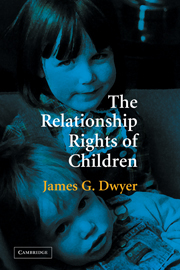Book contents
- Frontmatter
- Contents
- Acknowledgments
- THE RELATIONSHIP RIGHTS OF CHILDREN
- Introduction
- 1 Why Rights for Children?
- 2 The Existing Relationship Rights of Children
- 3 Paradigmatic Relationship Rights
- 4 Why Adults Have the Relationship Rights They Do
- 5 Extending the Theoretical Underpinnings of Relationship Rights to Children
- 6 Rebutting Defenses of the Status Quo
- 7 Implementing Children's Moral Rights in Law
- 8 Applications
- Appendix: The Conceptual Possibility of Children Having Rights
- Notes
- Index
6 - Rebutting Defenses of the Status Quo
Published online by Cambridge University Press: 23 July 2009
- Frontmatter
- Contents
- Acknowledgments
- THE RELATIONSHIP RIGHTS OF CHILDREN
- Introduction
- 1 Why Rights for Children?
- 2 The Existing Relationship Rights of Children
- 3 Paradigmatic Relationship Rights
- 4 Why Adults Have the Relationship Rights They Do
- 5 Extending the Theoretical Underpinnings of Relationship Rights to Children
- 6 Rebutting Defenses of the Status Quo
- 7 Implementing Children's Moral Rights in Law
- 8 Applications
- Appendix: The Conceptual Possibility of Children Having Rights
- Notes
- Index
Summary
The conclusion that children are morally entitled to legal relationship rights equivalent to those of adults, and therefore to state decision making that either respects their wishes or focuses exclusively on their welfare or on establishing the conditions for their healthy development toward autonomy, would entail a diminution of the legal rights adults currently enjoy. In particular, biological parents' right to occupy the role of legal parent would diminish, and legal parents' rights to custody or visitation and even to remain in a parental role at all would shrink. This conclusion would also run directly up against certain broad societal aims, including some, such as racial, gender, and religious equality, that are reflected in constitutional norms.
Of course, the legal rights we competent adults possess in connection with our intimate associations authorize us to make choices solely for our own benefit, without giving to the interests of others the sort of deference that the law governing children's relationships now gives to the interests of adults and without having to serve any broad societal aims. It should mute objections to some degree to point out that what is being claimed here for children is no more than what we adults have given ourselves and that resisting this conclusion would entail arguing that children should have less than equivalent rights. Nevertheless, the idea that the family law decisions addressed in this book ought to accommodate, to at least some degree, the interests of adults and the progressive aims of a liberal society has a strong hold on many people.
- Type
- Chapter
- Information
- The Relationship Rights of Children , pp. 170 - 204Publisher: Cambridge University PressPrint publication year: 2006



